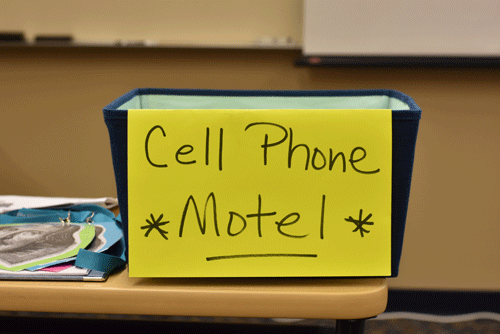‘New’ phone policy gets mixed student responses

September 28, 2018
Annually, North’s administration talks to staff and students about what can be done to improve the school. In regards to school rules, the topic of conversation as of late has been the phone policy.
The discussion has become much more prevalent due to the teacher’s frustration with the continual distraction to the students’ learning. As with any topic that affects students, there are bound to be discussion and opinions flying around. Everyone seems to have their own opinion about the use of phones at school.
The student handbook addresses many different topics including the dress code and detention policy. The only paragraph regarding the phone policy reads: ‘Students are allowed to use cell phones and electronic devices only in the commons, hallways and locker bays.
Upon entering the classroom, all cell phones and all non-school issued electronic devices will be put away unless they are deemed to be educationally appropriate by the classroom teacher.’ The rest of the section is a summary of actions that will be taken based on the violation of the policy.
Contrary to popular belief, there have been no changes to the official student handbook about the phone policy. “There has simply been more discussion about phone usage and how phones are a distraction to students and their learning,” principal Andy Dahlen said. “Teachers have been the ones bringing it up for discussion.”
Dahlen hopes to get student council members and other student role models involved as he believes that is the only way to get students to listen.
“It’s about the implementation and execution of the policy more than anything else,” Dahlen said.
Student stances seem to vary between neutral and opposed.
“I’m supposed to be there to learn anyway so I don’t think it’s a bad thing,” senior Franz Mendoza said.
This falls in line with how the school views the issue. Education at school is the top priority for teachers and phones don’t generally have a place in the classroom besides occasional activities.
Seniors Cambrie Watson and Alena Pringle, however, think negatively of the phone policy. “Students will just want to use their phones more with strict regulations. Teenagers naturally like to go against authority so I doubt it will do anything but make students more likely to retaliate,” Watson said.
The idea that more regulations on phone use will create the opposite effect is certainly one worth pondering for administrators and teachers.
“I only use my phone in class when I’m not engaged. I wouldn’t use my phone if I actually felt engaged during classes,” said Pringle.
This alludes to a different problem: lack of engagement in class time and material. This issue may be tied in with phones, but likely will need a different solution if it proves to be worth examining.
Whatever your stance is on the phone policy, it’s being enforced to help you take your education seriously.
The administration’s job is to create the best learning environment for students, and phones often don’t have a place in that. Phone usage is often addicting which should be a considered factor. The phone policy will likely continue to be hot topic as phones aren’t going anywhere.